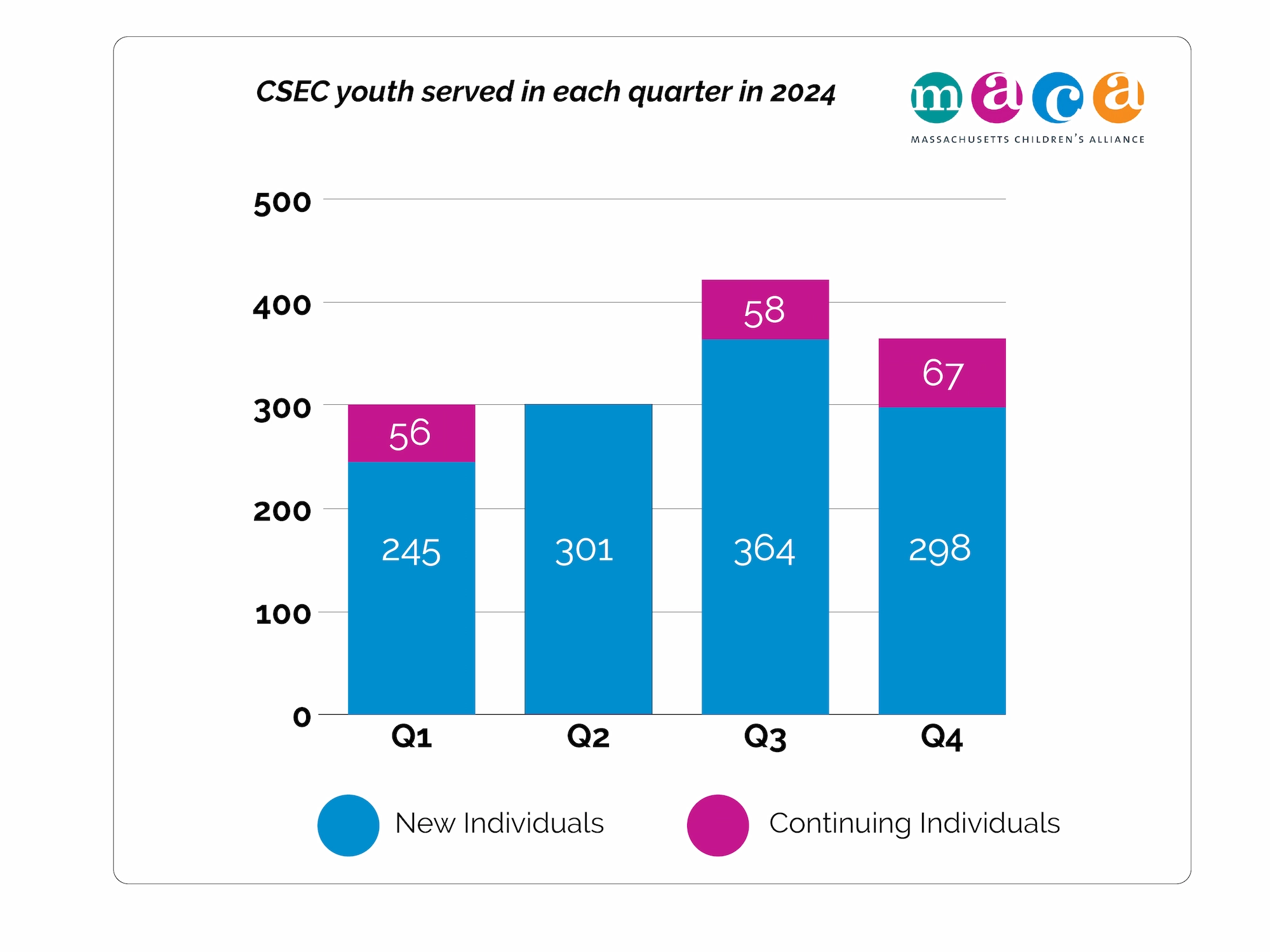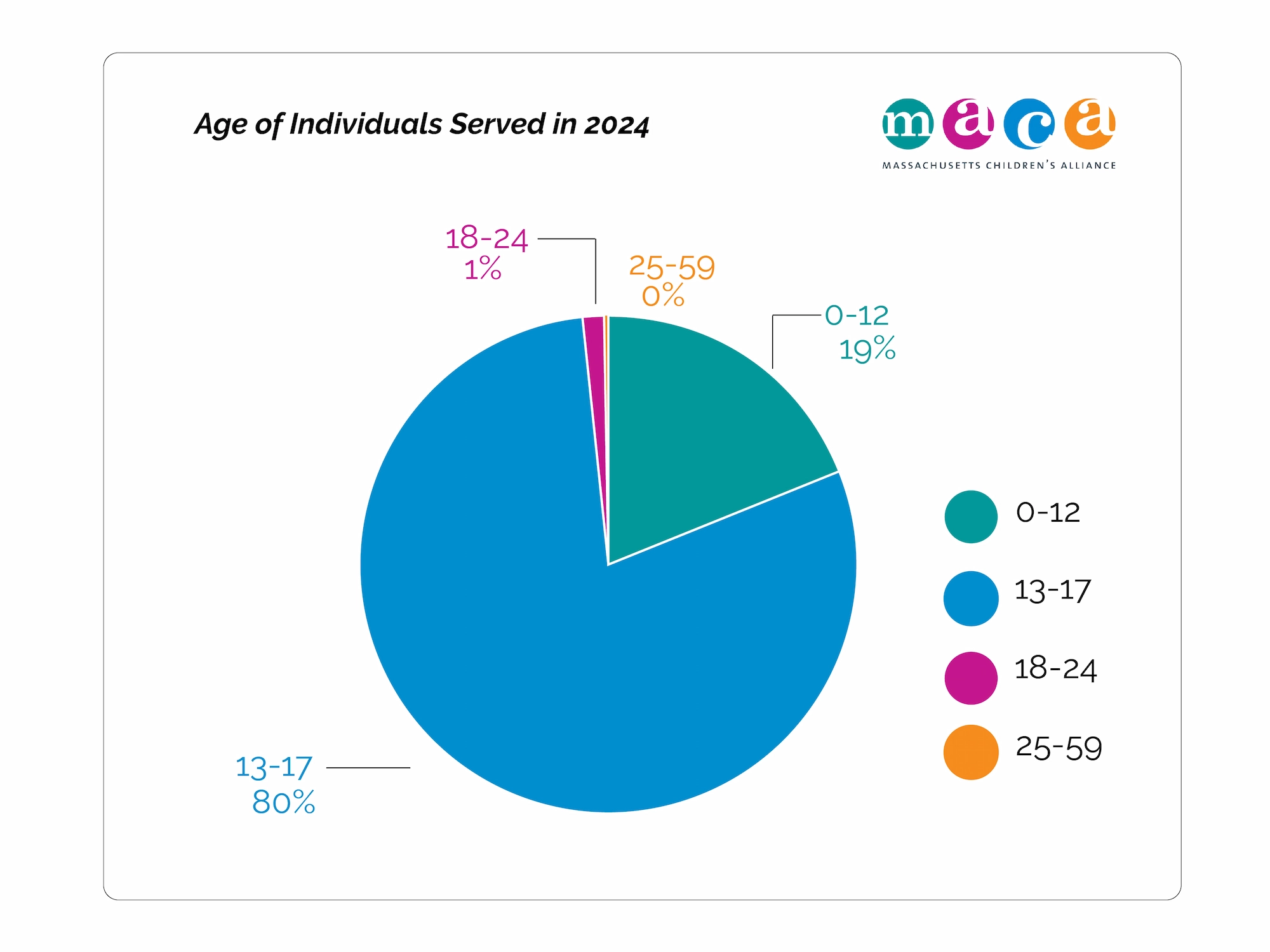MACA continues to strengthen its Commercial Sexual Exploitation of Children (CSEC) Service Enhancement Project, ensuring that child victims of exploitation receive trauma-informed, evidence-based care. In 2024, we introduced significant advancements in data collection, service coordination, and the implementation of Core Standards, reinforcing Massachusetts’ position as a national leader in CSEC response.
Updates on our work to address the Commercial Sexual Exploitation of Children

(CSEC Youth Served in each quarter in 2024)

(Age of individuals served in 2024)
In 2024, 1208 unique victims received 29,243 services.
- 19% of the children helped were age 12 or younger, and
- 44% experienced multiple types of victimization.
In addition, CSEC Case Managers provided 233 outreach activities and trained 4,446 individuals, including MDT members and community members, on CSEC and the services available to victims.
This year, MACA enhanced its CSEC data collection system, introducing critical improvements to better track and support youth impacted by exploitation:
- Universal Individual ID System: Enables streamlined tracking of multi-jurisdictional cases, ensuring continuity of care and accurate documentation of youth engagement in CAC services.
- Enhanced CSAM (Child Sexual Abuse Material) Data Collection: Differentiates between self-generated and AI-generated content, aiding in targeted interventions and legal responses.
- Tracking Missing & Absent Youth: Improves identification of at-risk children and strengthens intervention strategies.
- Identifying Service Gaps: Uses data insights to improve access to critical resources for CSEC victims.
Following a six-month pilot program in 2024, the full statewide implementation of Massachusetts’ CSEC Core Standards launched in January 2025. Massachusetts remains one of the only states in the country with its own state-specific core standards for CSEC response, setting a precedent for best practices beyond the National Children’s Alliance (NCA) optional standard.
Key aspects of the implementation include:
- Pilot Program Success: Three CACs participated in the 2024 pilot, with two meeting five of six standards and one achieving full compliance.
- Statewide Rollout: Quarterly reporting throughout the next year (April, July, October) will track progress, with a midpoint training in July and a final evaluation in December 2025 to assess statewide adoption and effectiveness.
- Impact: Strengthens multi-disciplinary collaboration, standardizes data collection, and ensures trauma-informed, victim-centered responses across all 12 CACs.
MACA’s CSEC Statewide Program Manager, Marcus Puelo, continues to lead efforts in training, technical assistance, and policy advocacy at both state and national levels. This role has been instrumental in guiding CACs through the Core Standards implementation, conducting individualized training, and fostering collaboration between law enforcement, child protection agencies, and service providers.
Massachusetts’ work has gained national recognition, with our staff serving on key advisory groups, including:
- NCA CSEC Working Collaborative
- Governor’s Council Subcommittees on Human Trafficking & Labor Trafficking
- MA Child Trafficking Leadership Advisory Board
“As we look ahead into 2025, the revamped data collection system and full adoption of core standards mark a turning point for Massachusetts’ CSEC response. With enhanced tracking tools, expanded training opportunities, and strengthened multidisciplinary partnerships, MACA is laying the foundation for a sustainable, data-driven approach that ensures CSEC victims receive the comprehensive care and justice they deserve.” – MACA’s CSEC Statewide Manager, Marcus Puleo